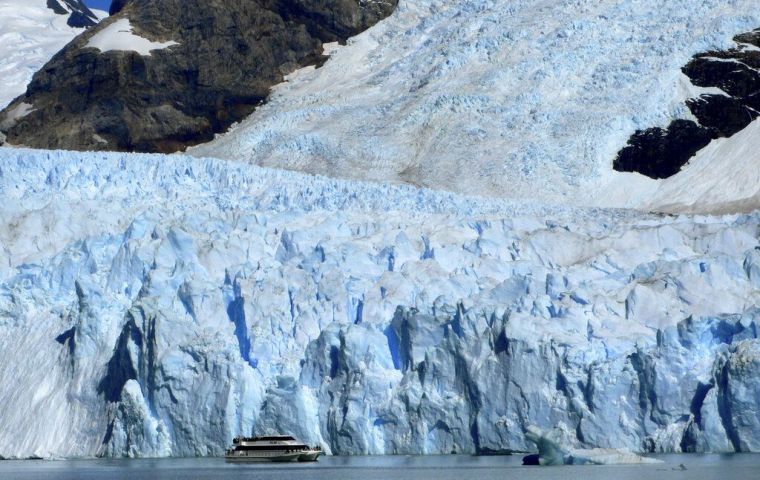MercoPress. South Atlantic News Agency
Argentine Justices uphold Glacier Law: setback for one of world's biggest gold miners
 Justices voted unanimously to uphold the law, arguing plaintiffs had not provided sufficient evidence to support their claim that the law infringed their right to mine
Justices voted unanimously to uphold the law, arguing plaintiffs had not provided sufficient evidence to support their claim that the law infringed their right to mine The Argentine Supreme Court ruled against a legal claim by mining companies Barrick Gold Corp and Minera Argentina Gold arguing that Argentina's Glacier Law was unconstitutional. The decision was praised by environmentalists and marked a setback for one of the world's biggest gold miners.
The justices voted unanimously to uphold the law's validity on constitutional grounds, determining that the plaintiffs had not provided sufficient evidence to support their claim that the law infringed their right to mine Argentina's natural resources.
“The challenge posed by Barrick is ruled inadmissible,” the ruling declared.
Barrick had argued that the 2010 law could affect its projects near glacial areas in Argentina. But the justices said Barrick had not proved that the law curbing mining on and around the country's glaciers to protect water supplies had caused any damage to the company at all.
Barrick owns Pascua-Lama, a high-altitude mine that straddles the Argentina-Chile border. It also runs the Veladero mine in Argentina's San Juan province.
The Argentine law broadly defines glaciers, so it protects not only the icy masses most people think of but also “rock glaciers” and frozen groundwater on mountaintops where glaciers have melted away from the surface. The Argentine National Glacier Institute, which had a big hand in drafting the law, pushed the definition because it is believed most glacial water actually comes from such reserves.
“We celebrate the ruling because there's no doubt that glaciers must be protected,” Greenpeace Argentina spokesperson Gonzalo Strano said in a statement.
“Barrick's request to declare the unconstitutionality of the national law was a perverse play that fortunately lost,” Strano said. “Now, the law must be followed and Veladero must be closed. We can no longer allow mining on Argentine glaciers.”
The Supreme Court Justices ruled that the province of San Juan, which supported the gold mining firms in their claim, had also not sufficiently explained how provisions in the legislation had caused the province any damages or infringed its rights to mine natural resources.
The Court reiterated that protection of Argentina's glaciers was a shared responsibility between provinces and the federal government, according to the law in question. In 2011, the Supreme Court overruled a San Juan provincial court decision from the previous year that determined the law was unconstitutional.




Top Comments
Disclaimer & comment rules-

-

Read all commentsWell, done the Argentine Supreme Court. Which put into effect the legal maxim of 'first, to do no harm.' https://en. wikipedia.org/wiki/Harm_principle
Jun 07th, 2019 - 11:00 am +1“The principle behind the maxim dates back to the English law of the mid-thirteenth century. Henry of Bracton, a judge and prominent legal scholar of that era, stated that “no one may do in his own estate any thing whereby damage or nuisance may happen to his neighbour.” Bracton, whose writings provide a foundation for later nuisance law, noted that a landowner could not, in raising a pond, flood his neighbour’s land; nor could he divert a watercourse and deprive his neighbour of water.”
https://environment.probeinternational.org/chapter-2-so-not-harm-another/
@Terence Hill
Jun 12th, 2019 - 01:14 pm 0REF: “the legal maxim”:
But of course, sh*tting in one's own back/front yard is permitted! ALL the politicians do it ANYWAY!
Commenting for this story is now closed.
If you have a Facebook account, become a fan and comment on our Facebook Page!